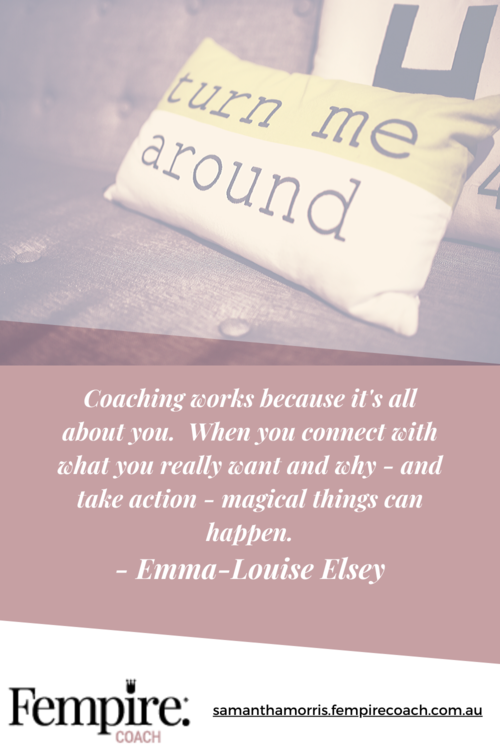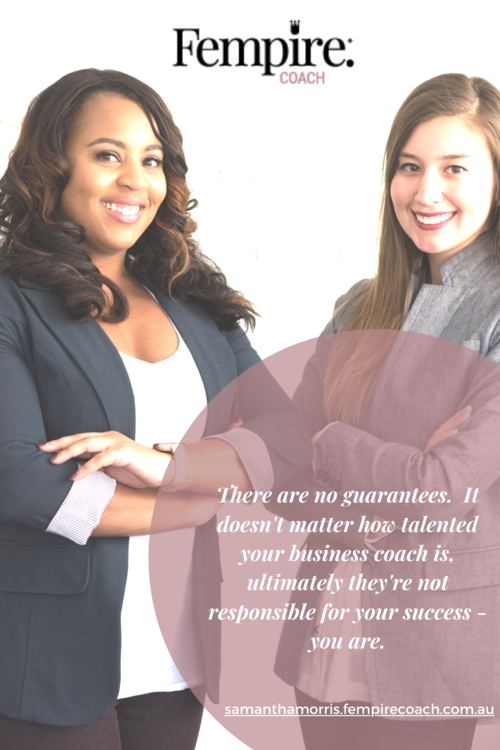
Have you ever thought about getting a business coach? Think they’re only for big business? Think again!
If you think that a business coach might be able to help you in your business, there are a few things that you need to work out before you start looking.
When I started doing my initial research into becoming a coach, I was saddened with the number of people who were disappointed with their business coaching experience.
With so many great business coaches out there – it can be hard to find the one that is going to take you and your business to the level you want to go. Even harder to find a great coach – if you don’t know how to look.
That’s why it is so important to do your research and find the right fit for you. I never wanted my clients to feel that way about me. That is why I have written this, to give you an idea of the process you should go through before engaging a coach.
1. Ask for referrals from friends
Word of mouth is still one of the primary ways we like to find any product or service. It is why influencers do so well – they will recommend and refer. You may not know an influencer, but ask your friends, family members, social media connections or networking groups if they know of any business owners that have used a business coach. If so who did they use and was it successful?
Remember that if it wasn’t successful for them, doesn’t mean it won’t be for you. There are many reasons why this may have happened and this is your opportunity to learn what went wrong for them so that you increase your chances of success for your business.
2. Do some online research
The next step is to do some research online, have a look at their website, have a look at their social media, get a feel for what kind of coach they are before you make contact with them. There are many types of business coaches with varying areas of strength.
3. Arrange an initial meeting
Most coaches will offer you a free introductory session, where you get to meet and have a chat, at Fempire we certainly do.
Depending on where they’re located this might be an online meeting, or it could be an in-person meeting. These meetings are essential, they are free and you have to take them up on them because that conversation you have will determine how and if you proceed with this business coach or not.
You should really avoid working with any coach who isn’t willing to have that initial meeting with you. You need to be able to determine whether you’re compatible with them or not. Once you are in that meeting with a business coach, the first thing you need to be attuned to is whether they’re actually listening to you or whether they’re just talking about and promoting themselves.
A good coach will listen to what you need and assess whether they can provide solutions for you and your business. It isn’t about them.
You do want a coach who’s going to jump in there and let you know whether they can help you, whether they’re a good fit. You want a coach who is actually going to be able to pull you up when you are going down the wrong track. If they don’t speak out about things how are they going to help you?

4. Listen to your intuition – it will lead you down the right path
While you’re talking to a business coach and having this conversation, take a moment to consider the conversation, what’s your gut telling you, what is your intuition saying? If there are warning bells going off, anywhere, then they’re not the right coach for you.
Marnie LeFevre explains eloquently how important intuition is in business by describing it as “The Sixth Business Sense”. The key in using intuition effectively is to understand that the business decision making process should be a balance between your research and your intuition. Just because something seems good on paper, doesn’t mean it is right for you.
5. Experience, Education, Success – what is important for you to have in a Business Coach?
Ask about your coaches experience; what education do they have, what work have they done, what results that they got, what clients have they worked with, who are their success stories.
This will give you an idea of whether you think that they can help you achieve what you’re looking to achieve. Of course this will not give you a definitive answer (see Tip 4.)
In your research to find a business coach, you will come across those that are new to the job. They may have no reviews, no clients, no coaching history. Do not discount this person as an option. Think about this – every coach out there started somewhere. This is why a more thorough overview of a coach is needed – experience, education, work history – all important ingredients in the mix. Your intuition may tell you that you may be their first client, but they are the right coach for you.
6. What style of Coach do you want?
All coaches have a different style of delivering results. Some are very focused on particular areas of business and will deliver nuts and bolts training to you, some will want to focus on mindset, some will determine which you need most and go from there. So, ask about how they coach clients and how they deliver their coaching; is it just to catch up once a month, is it a weekly schedule where you have to check-in, what is their process?
Have an idea of the outcomes you are looking for and ask how they might help you achieve that.
Be pointed in asking how they intend delivering their service and ask yourself will that serve you best?
7. Communication and boundaries
The next thing you need to ask is if they’re going to be available to you, between your sessions. You know, if the coach is only going to talk to you once a month, that can leave you flailing a little bit. You can struggle to reach goals because if you get lost along the way, and they’re not willing to converse with you via text or email or have brief phone conversations with you, then you’re looking at a very long term proposition to achieve anything.
People who are looking for a business coach are usually not looking long term, they want results in the foreseeable future. Results take time to achieve so don’t expect miracles in the first week. DIscuss what you want to achieve and ask them to explain the timeframe in which they believe they can get you there.
Whilst coaching is not a guaranteed fast track for fame and fortune, it is reasonable to think that a coach will be able to help you produce great results in 12 months – as long as you put in the work needed.
8. Money Spent or Money Well Spent?
You have to keep an open mind about the money that you’re investing in your business with a coach, you’re not buying the coaches time you’re buying their knowledge, their wisdom, their experience, and you’re buying their ability to get you on track, and achieve results. So, what you need to think about is, if you stay in your current path can you get there yourself? If you answered yes and you aren’t there already then think about your answer again.
What are the projections for your business over the next 12 months versus if you take on a coach and you achieve your goals? What does your business look like in 12 months?
If you’re looking at growing your business by $100,000 in the next 12 months, then spending 10 or 15% of that on a business coach to help you get there is a very worthy investment, don’t you think? Let’s put this into perspective in a different way. You could employ a part time person at $20,000 do to some admin work for you. At the end of twelve months will that investment improve your business by $100,000?
The other way to look at it is – have you done $100,000 in the last 12 months yourself, because if you’re answering no, then stop thinking about what you’re spending and start thinking about what you’re going to get back.
9. Quick fix or lasting results – you choose

In this fast paced world we live in I realise everyone is looking for quick fixes. I know when I speak with prospective clients I try to be very clear I am more about creating positive and permanent change rather than a quick fix that isn’t sustainable.
Where does a quick fixer leave your business? Back in the same position in 12 months time. Don’t do it! You’ve got to be prepared for the long game and putting in the work.
Although there are success stories, and you’ll hear about coaches who have worked with clients and they’ve had phenomenal success in three months or four months, you’ve got to understand that it is rare. That doesn’t happen for everybody.
On average, most coaches should be working with you and planning a 12-month strategy to achieve your goals. Anything less than that is really, really good, but you’ve got to manage your expectations. I’m not saying it won’t happen for you, but you have got to be prepared for that, as I said, it’s a rare thing that happens.
10. Courtship before Commitment
Before you make any kind of commitment to a business coach or coaching program, are you ready to do the hard work and are you ready for the change? Being coached means that sometimes being told you’re not doing things the right way. It means accepting that you don’t know everything. It means giving up a little bit of the control of your business.
You have to learn to see things differently because the way you’re seeing things now isn’t getting you where you want to be. If you are getting where you want to be you wouldn’t be looking for a business coach – but even then you should be.
A coach is going to push you out of your comfort zone. Are you ready for that?
11. Location, Location, Location
You shouldn’t restrict your search for a business coach to your local area. These days, a lot of coaches will coach clients via Skype or zoom or any number of other platforms so you’re still getting that face to face coaching, but virtual.
Fempire offers face to face and online coaching to our female business owners because we understand that it can better meet their needs to offer these options.
12. Does a coach need to be an industry expert?
Not necessarily. There are instances where the size of your business or the particular challenges you are facing will require industry expertise, but if you have a great coach then they will know if they can’t serve you and will recommend someone who can. A coach does not have to be an expert in your particular industry.
An experienced coach can give you suggestions and can help you build an amazing business model to help you achieve your goals.
13. Coach vs Consultant – what’s the difference?
The final piece of advice I offer you is that there is a key difference between a coach and a consultant. Let me explain it like this, if I was your swimming coach, I’m not the one in the pool doing freestyle up and back and up and back – you are. I’m standing on the sidelines cheering you on, correcting your stroke and pushing you to do that extra lap. A consultant is going to jump in the pool and do some of the swimming for you to get you started and set up.
If you want a business coach, they’re not going to do the work for you and they shouldn’t be. It’s about teaching you, it’s about enabling you. It’s about you embracing the success that you can potentially have yourself by doing that hard work yourself.

Conclusion
Unfortunately, many small businesses in Australia fail. I believe this can be prevented if business owners receive the help, education and motivation they need to be successful.
Getting a business coach for your business early in the game increases your chances of having the business of your dreams exponentially.
Doing your due diligence and being honest about what you want to achieve will help you find the right person.
If you’re not sure where to start or you need help actioning any of these steps, please book a FREE 30 minute strategy session with me and I’ll help to make it easier for you to make what may be some very difficult decisions. You don’t need to do this alone.


